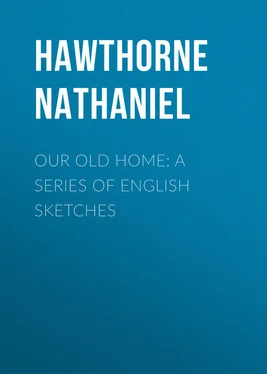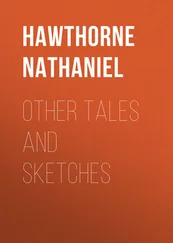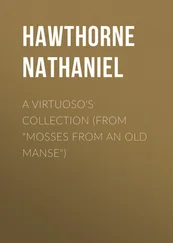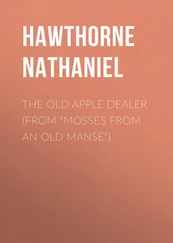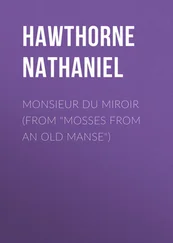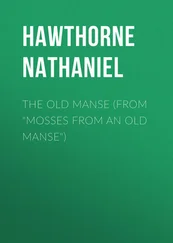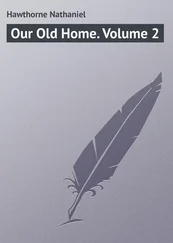Nathaniel Hawthorne - Our Old Home - A Series of English Sketches
Здесь есть возможность читать онлайн «Nathaniel Hawthorne - Our Old Home - A Series of English Sketches» — ознакомительный отрывок электронной книги совершенно бесплатно, а после прочтения отрывка купить полную версию. В некоторых случаях можно слушать аудио, скачать через торрент в формате fb2 и присутствует краткое содержание. Жанр: literature_19, foreign_antique, foreign_prose, на английском языке. Описание произведения, (предисловие) а так же отзывы посетителей доступны на портале библиотеки ЛибКат.
- Название:Our Old Home: A Series of English Sketches
- Автор:
- Жанр:
- Год:неизвестен
- ISBN:нет данных
- Рейтинг книги:4 / 5. Голосов: 1
-
Избранное:Добавить в избранное
- Отзывы:
-
Ваша оценка:
- 80
- 1
- 2
- 3
- 4
- 5
Our Old Home: A Series of English Sketches: краткое содержание, описание и аннотация
Предлагаем к чтению аннотацию, описание, краткое содержание или предисловие (зависит от того, что написал сам автор книги «Our Old Home: A Series of English Sketches»). Если вы не нашли необходимую информацию о книге — напишите в комментариях, мы постараемся отыскать её.
Our Old Home: A Series of English Sketches — читать онлайн ознакомительный отрывок
Ниже представлен текст книги, разбитый по страницам. Система сохранения места последней прочитанной страницы, позволяет с удобством читать онлайн бесплатно книгу «Our Old Home: A Series of English Sketches», без необходимости каждый раз заново искать на чём Вы остановились. Поставьте закладку, и сможете в любой момент перейти на страницу, на которой закончили чтение.
Интервал:
Закладка:
It was an apartment of very moderate size, painted in imitation of oak, and duskily lighted by two windows looking across a by-street at the rough brick-side of an immense cotton warehouse, a plainer and uglier structure than ever was built in America. On the walls of the room hung a large map of the United States (as they were, twenty years ago, but seem little likely to be, twenty years hence), and a similar one of Great Britain, with its territory so provokingly compact, that we may expect it to sink sooner than sunder. Farther adornments were some rude engravings of our naval victories in the War of 1812, together with the Tennessee State House, and a Hudson River steamer, and a colored, life-size lithograph of General Taylor, with an honest hideousness of aspect, occupying the place of honor above the mantel-piece. On the top of a bookcase stood a fierce and terrible bust of General Jackson, pilloried in a military collar which rose above his ears, and frowning forth immitigably at any Englishman who might happen to cross the threshold. I am afraid, however, that the truculence of the old General's expression was utterly thrown away on this stolid and obdurate race of men; for, when they occasionally inquired whom this work of art represented, I was mortified to find that the younger ones had never heard of the battle of New Orleans, and that their elders had either forgotten it altogether, or contrived to misremember, and twist it wrong end foremost into something like an English victory. They have caught from the old Romans (whom they resemble in so many other characteristics) this excellent method of keeping the national glory intact by sweeping all defeats and humiliations clean out of their memory. Nevertheless, my patriotism forbade me to take down either the bust, or the pictures, both because it seemed no more than right that an American Consulate (being a little patch of our nationality imbedded into the soil and institutions of England) should fairly represent the American taste in the fine arts, and because these decorations reminded me so delightfully of an old-fashioned American barber's shop.
One truly English object was a barometer hanging on the wall, generally indicating one or another degree of disagreeable weather, and so seldom pointing to Fair, that I began to consider that portion of its circle as made superfluously. The deep chimney, with its grate of bituminous coal, was English too, as was also the chill temperature that sometimes called for a fire at midsummer, and the foggy or smoky atmosphere which often, between November and March, compelled me to set the gas aflame at noonday. I am not aware of omitting anything important in the above descriptive inventory, unless it be some book-shelves filled with octavo volumes of the American Statutes, and a good many pigeon-holes stuffed with dusty communications from former Secretaries of State, and other official documents of similar value, constituting part of the archives of the Consulate, which I might have done my successor a favor by flinging into the coal-grate. Yes; there was one other article demanding prominent notice: the consular copy of the New Testament, bound in black morocco, and greasy, I fear, with a daily succession of perjured kisses; at least, I can hardly hope that all the ten thousand oaths, administered by me between two breaths, to all sorts of people and on all manner of worldly business, were reckoned by the swearer as if taken at his soul's peril.
Such, in short, was the dusky and stifled chamber in which I spent wearily a considerable portion of more than four good years of my existence. At first, to be quite frank with the reader, I looked upon it as not altogether fit to be tenanted by the commercial representative of so great and prosperous a country as the United States then were; and I should speedily have transferred my headquarters to airier and loftier apartments, except for the prudent consideration that my government would have left me thus to support its dignity at my own personal expense. Besides, a long line of distinguished predecessors, of whom the latest is now a gallant general under the Union banner, had found the locality good enough for them; it might certainly be tolerated, therefore, by an individual so little ambitious of external magnificence as myself. So I settled quietly down, striking some of my roots into such soil as I could find, adapting myself to circumstances, and with so much success, that, though from first to last I hated the very sight of the little room, I should yet have felt a singular kind of reluctance in changing it for a better.
Hither, in the course of my incumbency, came a great variety of visitors, principally Americans, but including almost every other nationality on earth, especially the distressed and downfallen ones like those of Poland and Hungary. Italian bandits (for so they looked), proscribed conspirators from Old Spain, Spanish-Americans, Cubans who processed to have stood by Lopez and narrowly escaped his fate, scarred French soldiers of the Second Republic, – in a word, all sufferers, or pretended ones, in the cause of Liberty, all people homeless in the widest sense, those who never had a country or had lost it, those whom their native land had impatiently flung off for planning a better system of things than they were born to, – a multitude of these and, doubtless, an equal number of jail-birds, outwardly of the same feather, sought the American Consulate, in hopes of at least a bit of bread, and, perhaps, to beg a passage to the blessed shores of Freedom. In most cases there was nothing, and in any case distressingly little, to be done for them; neither was I of a proselyting disposition, nor desired to make my Consulate a nucleus for the vagrant discontents of other lands. And yet it was a proud thought, a forcible appeal to the sympathies of an American, that these unfortunates claimed the privileges of citizenship in our Republic on the strength of the very same noble misdemeanors that had rendered them outlaws to their native despotisms. So I gave them what small help I could. Methinks the true patriots and martyr-spirits of the whole world should have been conscious of a pang near the heart, when a deadly blow was aimed at the vitality of a country which they have felt to be their own in the last resort.
As for my countrymen, I grew better acquainted with many of our national characteristics during those four years than in all my preceding life. Whether brought more strikingly out by the contrast with English manners, or that my Yankee friends assumed an extra peculiarity from a sense of defiant patriotism, so it was that their tones, sentiments, and behavior, even their figures and cast of countenance, all seemed chiselled in sharper angles than ever I had imagined them to be at home. It impressed me with an odd idea of having somehow lost the property of my own person, when I occasionally heard one of them speaking of me as "my Consul"! They often came to the Consulate in parties of half a dozen or more, on no business whatever, but merely to subject their public servant to a rigid examination, and see how he was getting on with his duties. These interviews were rather formidable, being characterized by a certain stiffness which I felt to be sufficiently irksome at the moment, though it looks laughable enough in the retrospect. It is my firm belief that these fellow-citizens, possessing a native tendency to organization, generally halted outside of the door to elect a speaker, chairman, or moderator, and thus approached me with all the formalities of a deputation from the American people. After salutations on both sides, – abrupt, awful, and severe on their part, and deprecatory on mine, – and the national ceremony of shaking hands being duly gone through with, the interview proceeded by a series of calm and well-considered questions or remarks from the spokesman (no other of the guests vouchsafing to utter a word), and diplomatic responses from the Consul, who sometimes found the investigation a little more searching than he liked. I flatter myself, however, that, by much practice, I attained considerable skill in this kind of intercourse, the art of which lies in passing off commonplaces for new and valuable truths, and talking trash and emptiness in such a way that a pretty acute auditor might mistake it for something solid. If there be any better method of dealing with such junctures, – when talk is to be created out of nothing, and within the scope of several minds at once, so that you cannot apply yourself to your interlocutor's individuality, – I have not learned it.
Читать дальшеИнтервал:
Закладка:
Похожие книги на «Our Old Home: A Series of English Sketches»
Представляем Вашему вниманию похожие книги на «Our Old Home: A Series of English Sketches» списком для выбора. Мы отобрали схожую по названию и смыслу литературу в надежде предоставить читателям больше вариантов отыскать новые, интересные, ещё непрочитанные произведения.
Обсуждение, отзывы о книге «Our Old Home: A Series of English Sketches» и просто собственные мнения читателей. Оставьте ваши комментарии, напишите, что Вы думаете о произведении, его смысле или главных героях. Укажите что конкретно понравилось, а что нет, и почему Вы так считаете.
